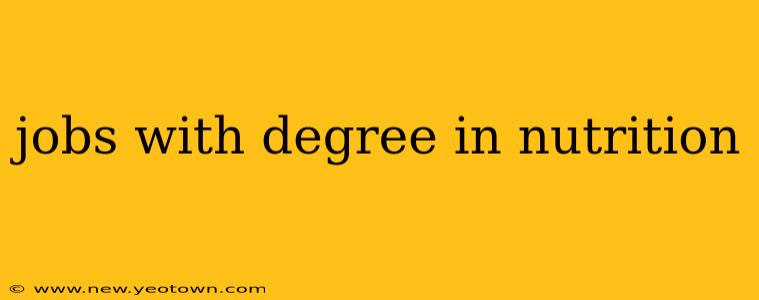The aroma of freshly baked bread, the vibrant colors of a farmers market, the satisfaction of helping someone achieve their health goals – these are just a few of the things that make a career in nutrition so rewarding. But what exactly can you do with a nutrition degree? The possibilities are surprisingly diverse, extending far beyond the stereotypical image of a dietitian. Let's explore the exciting career paths available to those passionate about food and well-being.
What are the different types of nutrition degrees?
Before diving into specific job roles, it's important to understand the different types of nutrition degrees available. The most common are Bachelor's degrees (BSc) in Nutrition, Dietetics, or Food Science, followed by Master's degrees (MSc) in specialized areas like public health nutrition, sports nutrition, or clinical nutrition. Some individuals also pursue doctoral degrees (PhD) to conduct research or teach at the university level. The specific requirements and job opportunities will vary based on the type and level of your degree.
What jobs can I get with a bachelor's degree in nutrition?
A bachelor's degree in nutrition serves as a solid foundation for a wide range of roles. You might not be able to independently practice as a registered dietitian (RD) or registered dietitian nutritionist (RDN) – that typically requires further accreditation – but many entry-level positions are accessible.
Health and Wellness Coach:
Many people with nutrition degrees find success as health and wellness coaches. They guide individuals towards healthier lifestyles through personalized plans and motivational support. This often involves creating meal plans, providing exercise recommendations, and offering general wellness advice. This role often relies heavily on building strong client relationships and demonstrating excellent communication skills.
Food Service Manager/Consultant:
If you're passionate about the culinary side of nutrition, a role in food service management or consultancy is perfect. Here you could manage menus, sourcing, and staff in restaurants, hospitals, schools, or corporate settings. You'd use your nutrition expertise to ensure the provision of healthy and appealing food options.
Community Health Educator:
This involves educating communities on nutrition and health topics through workshops, presentations, and outreach programs. You could work for government agencies, non-profits, or community organizations, making a significant impact on public health.
Research Assistant:
Many universities and research institutions hire nutrition graduates as research assistants. This allows you to gain valuable experience in the field, working alongside experienced researchers to investigate various aspects of nutrition and health.
What jobs require a master's degree in nutrition?
A Master's degree opens doors to more specialized and advanced roles, often requiring a higher level of expertise and licensing.
Registered Dietitian (RD)/Registered Dietitian Nutritionist (RDN):
This is the gold standard in the nutrition profession. RDs/RDNs provide medical nutrition therapy, develop individualized meal plans, and educate patients on dietary changes needed to improve or maintain their health. Becoming an RD/RDN usually requires a supervised internship after completing your Master’s degree.
Public Health Nutritionist:
These professionals work to improve the nutritional health of populations through policy changes, community programs, and research. They often work with government agencies or non-profit organizations.
Sports Nutritionist:
Sports nutritionists work with athletes to optimize their nutrition for peak performance. This involves creating personalized nutrition plans, educating athletes about proper fueling strategies, and monitoring their dietary intake. Often requires additional certification.
What about other frequently asked questions?
What is the job outlook for nutritionists?
The job outlook for nutritionists is generally positive, with growing demand for professionals in various settings. The aging population and increasing awareness of the link between diet and health are driving factors. However, competition can be fierce, particularly for advanced roles.
What salary can I expect with a nutrition degree?
Salaries vary significantly based on experience, education, location, and the specific role. Entry-level positions typically pay less, while advanced roles and those in high-demand areas offer higher salaries.
How do I become a registered dietitian (RD) or registered dietitian nutritionist (RDN)?
Becoming an RD or RDN involves completing an accredited education program, completing a supervised practice program (internship), and passing a national exam. The exact requirements vary depending on your location and accreditation bodies.
This is just a glimpse of the possibilities available with a nutrition degree. With passion, hard work, and the right educational path, you can find a fulfilling career that allows you to make a positive impact on the lives of others. Remember to research specific requirements and licensing regulations in your area to ensure you meet all the necessary qualifications for your chosen career path.

